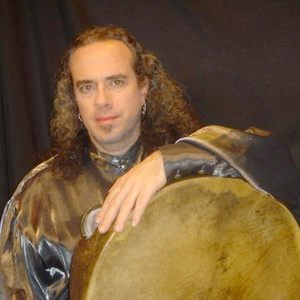by Daniel Hathaway

Benincasa’s toybox will provide the essential element of world percussion to Apollo’s Fire’s “Blues Café 1610” performances this week, five concerts that explore the parallels between the music you can hear in today’s jazz and blues clubs and their precursors of several hundred years ago. Benincasa thinks there’s a clear connection. “You have the venue itself — a café or somewhere people gather for entertainment — and songs that spontaneously spring up on subjects that are topical. For hundreds of years, nothing has really changed that much. People are still loving the same, being miserable the same, complaining the same. That’s what people write songs about.”
The songs on Apollo’s Fire’s program will include such European art music as Monteverdi’s Lamento della Ninfa and Giovanni Sances’s Madrigal a3, as well as instrumental dances by Diego Ortiz and love songs and ballads from Sephardic Spain.
A versatile musician, Rex Benincasa started playing drums in elementary school. Because he had a background in piano, his teachers nudged him in the direction of mallet percussion. When he went on to study at West Virginia University, he was introduced to African percussion, including the West African xylophone. Grad studies at the Manhattan School of Music took him into the contemporary worlds of Lou Harrison and John Cage. He’s played jazz, Dixieland and Big Band music, backed up singer-songwriters in New York clubs, collaborated with flamenco guitarists and dancers, played contemporary chamber ensemble and orchestral gigs, and subbed on Broadway, logging some thirty shows in the last sixteen years. “I don’t close any doors to anything,” he said. “Any genre that presents itself, I’ll dig in and do it.”
Though Benincasa has made music with just about every object that can be struck, shaken or jingled, including sheet metal and brake drums, he has a special affinity for folk instruments. “You can make music on anything. All you have to do is look around the world and see what people are using. You don’t have to have fancy stuff. I gravitate more to the sounds of natural instruments.”
An hour before each Apollo’s Fire concert, Rex Benincasa will give a pre-concert lecture. “I’m going to explain the instruments and their history. A lot of times, people are unfamiliar with their sounds and how they’re made. I’ll talk about the variety that exists in each family of instruments, explain the techniques I use to play them, and why they’re popular in this genre of music. I’ll explain why I’m bringing these particular instruments, which we have good reason to suspect were used by the people who originally played the music.”
Benincasa will also introduce the improvisatory aspects of the performances. “There’s never anything written out for me, so I try to come up with things that are going to be supportive of one line or another. I’ll explain how I paint with the sounds that I have and how I orchestrate on the spot, finding the best sound for that moment. I’ll demonstrate the instruments so that when the audience hears them, they won’t be surprised or distracted. Sometimes I put bells and shakers around my ankles, which makes it sound like there are two or three players involved. I want them to be familiar with that before we start the songs so they won’t be craning their necks to watch me.”
Rex Benincasa knows that his role in the music is important, but he’s mindful of being a team player. “You end up doing a lot of listening and you support the various lines as you go. The objective is to lay out a texture that will enhance what’s going on and not sound like a junkyard.”
“Blues Café 1610” will feature vocalists Nell Snaidas, Oliver Mercer, Karim Sulayman and Jeffrey Strauss, violinists Julie Andrijeski & Karina Schmitz, cellist René Schiffer, theorbists and guitarists William Simms & Brian Kay, percussionist Rex Benincasa and harpsichordist and director Jeannette Sorrell. It begins its run on Thursday, February 12 at 7:30 pm at The Temple Tifereth Israel in Beachwood.
Subsequent performances will take place on Friday, February 13 at 8 pm at St. Paul’s Episcopal Church in Cleveland Heights, on Saturday, February 14 at 8 pm at the Music Box Supper Club in Cleveland, on Sunday, February 15 at 4 pm at Rocky River Presbyterian Church, and on Monday, February 16 at 7:30 at Fairlawn Lutheran Church in Akron.
Published on ClevelandClassical.com February 10, 2015.
Click here for a printable copy of this article


